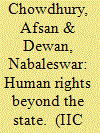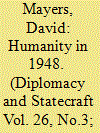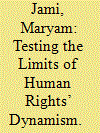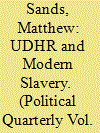| Srl | Item |
| 1 |
ID:
087092


|
|
|
|
|
| Publication |
2009.
|
| Summary/Abstract |
About a month before the 60th anniversary of the Universal Declaration of Human Rights (UDHR), the United States elected its first African-American president, Barack Obama. This historic event, a fitting milestone, brings to life that declaration, which human rights activists and legal scholars regard as the sacred text. Obama's election fulfills a dream of the U.S. civil rights movement, a struggle that relied as much on the UDHR as on the courage of the men and women who for decades fought to make the United States a ''more perfect union.'' For human rights defenders around the world, its significance cannot be overstated.
|
|
|
|
|
|
|
|
|
|
|
|
|
|
|
|
| 2 |
ID:
140070


|
|
|
| 3 |
ID:
141961


|
|
|
|
|
| Summary/Abstract |
By approving prohibitions on genocide and embracing the Universal Declaration of Human Rights (UDHR), the United Nations in 1948 sustained a theory premised on the centrality of people—both in their collective and individual capacities—that enjoyed primacy over the claims of the sovereign state. This affirmation of human rights dovetailed with the UN’s earlier endorsement of the Nuremberg principles with their emphasis on personal accountability. The melding of privileges and responsibilities gestured toward, although it did not fully encompass, that philosophical line strenuously espoused at the time by the eminent legal theorist, Hersch Lauterpacht: the state is not a sanctified end but merely the custodian of the welfare and ultimate purpose of human beings. This analysis examines the Genocide Convention and the UDHR and brings into conversation their drafting histories, politics, and diplomacy. It traces the saga of two seminal documents and their tandem fates in Cold War America. The collectivist project of the Genocide Convention and the individualistic emphasis of the UDHR are usefully placed in the same analytical frame, something seldom done in the literature that deals with human rights and norms-making of the late 1940s and their interaction with Cold War dilemmas. As peoples and governments pick their way through the hazards of the twenty-first century, it is exigent—for the sake of upright bearing—to stay mindful of the orientation prescribed in the Genocide Convention and the UDHR.
|
|
|
|
|
|
|
|
|
|
|
|
|
|
|
|
| 4 |
ID:
188812


|
|
|
|
|
| Summary/Abstract |
While the Universal Declaration of Human Rights (UDHR) deems human rights as universal and uniformly applicable to all societies, John Rawls’s idea of rights offers a narrower account of human rights which would be differential and acceptable to different societies and people. The notion emphasises that human rights move on a spectrum of continual development with regard to particularities and changing needs of different societies. Such an approach to human rights, Rawls argues, leads to better implementation of international human rights. Rawls’s analysis of human rights’ dynamic nature, however, remains confined only to macro-level variation of human rights among different societies. This article argues that human rights also vary within the same society. It charts how Afghan women’s conception of human rights has evolved from one period of the Taliban rule to another. This evolution indicates how, with the passage of time and the effect of external factors, new variants of women’s rights have emerged and became fundamental to the Afghan society. The article suggests that the Islamic Emirate of Afghanistan (IEA) should not ignore this evolution and development. Rather, it can seize the opportunity to cooperate with the international community and foreign powers to implement women’s rights within a middle framework between human rights notions of Rawls and the UDHR.
|
|
|
|
|
|
|
|
|
|
|
|
|
|
|
|
| 5 |
ID:
168746


|
|
|
|
|
| Summary/Abstract |
This article reflects on the prohibition of slavery set out in article 4 of the 1948 Universal Declaration of Human Rights, and analyses efforts undertaken in the years since to fulfil this commitment. It first addresses the evolution in the prohibition from historic forms of slavery to contemporary forms of slavery and human trafficking. Second, the article examines the Modern Slavery Act 2015 and the National Referral Mechanism to appreciate the UK's efforts to implement various international commitments to prohibit slavery, noting that the current focus towards criminalisation and the meagre support offered as victim protection does not constitute a sufficiently comprehensive strategy towards effective prohibition. Third, areas for reform are identified that could reorient government strategy toward more effective victim protection and support, starting with better identification of victims. And finally, the article argues in favour of actions that seek to prevent modern slavery crimes and abuse, including with a more robust regulatory framework that engages private sector actors to recognise the risks of slavery and exclude forced labour from supply chains.
|
|
|
|
|
|
|
|
|
|
|
|
|
|
|
|
| 6 |
ID:
122438


|
|
|
|
|
| Publication |
2013.
|
| Summary/Abstract |
Whereas recognition of the inherent dignity and of the equal and
inalienable rights of all members of the human family is the foundation
of freedom, justice and peace in the world,
Whereas disregard and contempt for human rights have resulted in
barbarous acts which have outraged the conscience of mankind, and
the advent of a world in which human beings shall enjoy freedom of
speech and belief and freedom from fear and want has been proclaimed
as the highest aspiration of the common people.
|
|
|
|
|
|
|
|
|
|
|
|
|
|
|
|